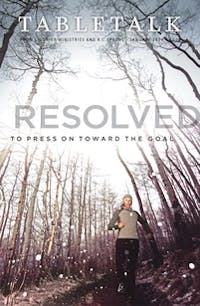
Request your free, three-month trial to Tabletalk magazine. You’ll receive the print issue monthly and gain immediate digital access to decades of archives. This trial is risk-free. No credit card required.
Try Tabletalk NowAlready receive Tabletalk magazine every month?
Verify your email address to gain unlimited access.
As we saw in last month’s installment of “Pro Ecclesia,” privileges and duties go together. In making disciples, Jesus commanded they be baptized in the name of the Father and of the Son and of the Holy Spirit and to teach them to observe all that He commanded. The second aspect of this commission (we dealt with the first last month), teaching disciples to obey Jesus, is first and foremost the duty of pastors and teachers — to teach the people the Scriptures and secondly to exhort them to faithfully commit the Word to heart. To put it in simple terms, the people look to their pastor for instruction; they see him as the key person in the church.
It is a fact of life that people come to the worship service usually for only one hour, half of which is taken up by singing and praying. This implies that the second half is for biblical instruction for a period that lasts more or less for thirty minutes. As a result, unless there is diligent Scripture reading at home, a knowledge of the Bible’s content leaves much to be desired. The well-known statistician George Barna conducted a survey of Bible knowledge among American church- goers and came to this conclusion.
It is also quite striking that the aspect of church life that receives the greatest amounts of time, attention, and energy — that of teaching people the content of the Bible — is one of the two areas in which people feel least equipped. The recent trend toward the adoption of technology to help in the teaching of important biblical truths is a welcome addition to the toolbox of our preachers and religious educators. Yet the research still suggests that most people do not feel as if they are learning enough about God, the Christian faith, or their role in the world — and most of them don’t seem to care.
There is more. Last year the successful preacher Bill Hybels, pastor of the Willow Creek Community Church, reported that he had failed the twelve thousand members of his mega-church. He acknowledged that he made a mistake in not producing spiritually mature Christians. He reached people by the thousands, but he did not make them disciples. Hybels is not alone. Upon self-examination, pastors agree with him. The goal of every pastor is to equip church members to go into the workaday week with the knowledge of God’s Word and apply it to every facet of life. That is, the one who buys and sells must realize that God’s all-seeing eye always observes every transaction. To put it differently, all of us are always in the presence of God, a concept encapsulated in the Latin coram Deo.
On October 10, 1898, the Dutch theologian and statesman Dr. Abraham Kuyper delivered his Stone Lectures at Princeton Theological Seminary. In them he set out a Christian worldview by stating that there is not so much as the space of a square inch of which Christ has not said, “It is mine.” Therefore, anyone who fills a respectable occupation in life must always be subservient to Jesus in that occupation. Because in Him, so Paul writes, are hidden all the treasures of wisdom and knowledge (Col. 2:3). This means that all life’s facts and figures are the property of Christ.
A distinction must be made between the concept that the church is an organization or an organism. In most organizations individual members are asked to pay annual dues, but when a member at some time fails to contribute the money, his membership is dropped as a matter of fact. This illustrates that an organization is not a living entity, as there is a businesslike approach to membership. By contrast, to say that the church is an organism, we immediately sense that an organism is alive. An organism throbs with life and constantly grows and expands. It takes an all-encompassing approach to life: the rearing of children in a Christian home; the relationship of husband and wife in an atmosphere of love and trust; the guiding and directing of teenagers to live a life that honors God; reaching out to those who are in need and supplying their wants; visiting the sick and the elderly; praying fervently for the coming of God’s kingdom.
In other words, the church is not merely a place where people gather on Sunday morning for an hour or two. It is not merely listening to the pastor’s sermon, which often is forgotten within twenty-four hours. It is taking the Word of God seriously into all the components of everyday life and applying Scripture’s teachings to business and labor, to the relation of medical doctors and patients, to lawyers and their clients, to teachers and students, to the duties of government officials and ordinary citizens, to presidents, prime ministers, and legislators, and to every one of us in respect to those who have been given authority over us.
How then shall we live and look to the future? By trusting the Lord our God and by obeying His precepts. Living with Him day by day spells a future that is bright with radiant glory, for it is God who is leading us along life’s pathway. With the psalmist we say, “Know that the Lord, he is God! It is he who made us, and we are his; we are his people, and the sheep of his pasture” (Ps. 100:3).
